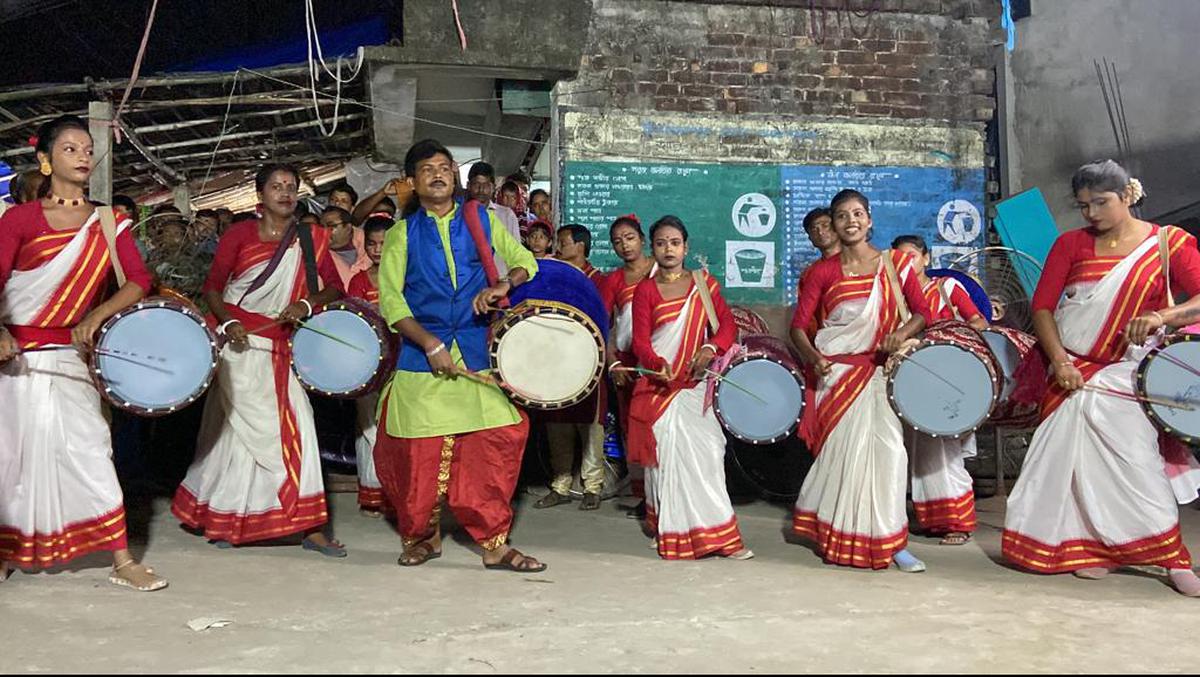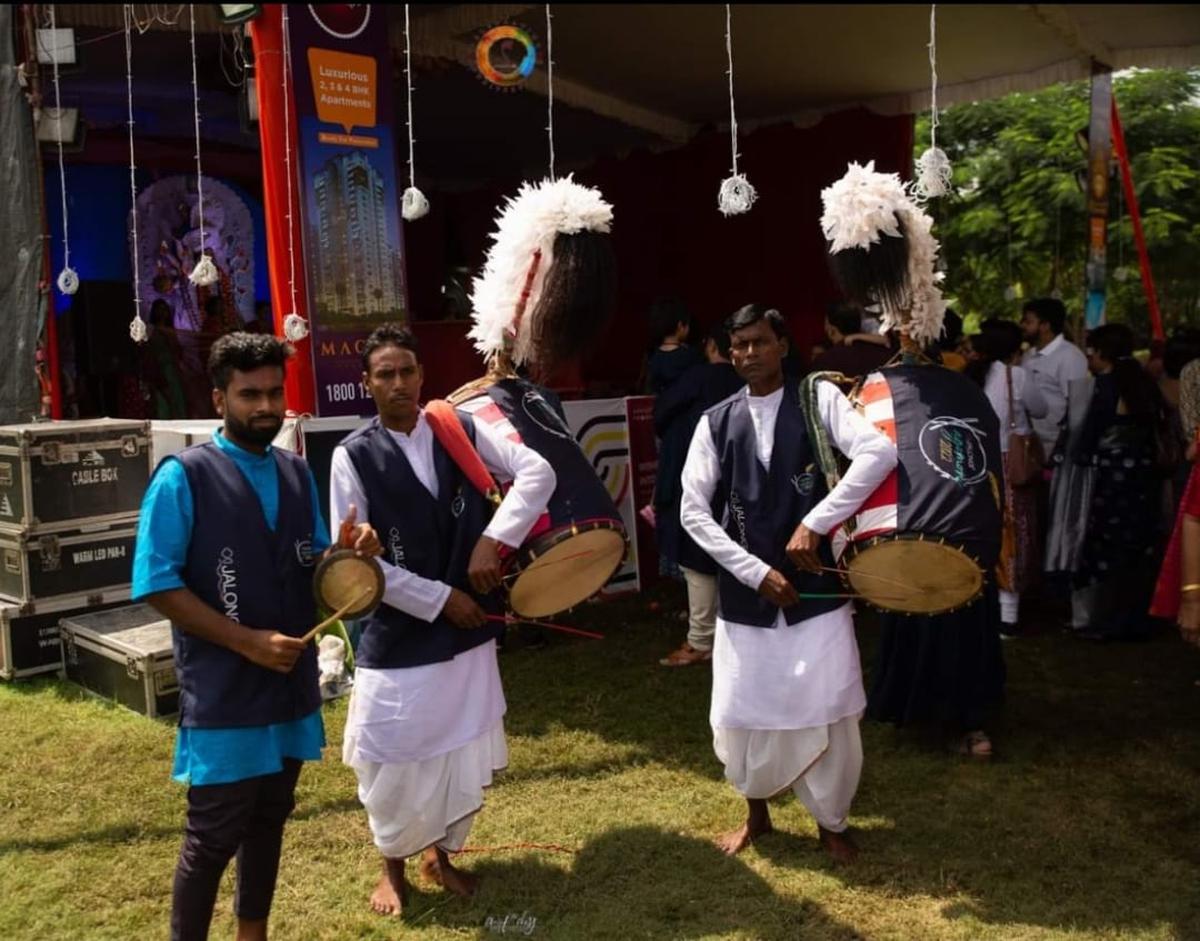[ad_1]
Dhakis, the traditional drummers from Bengal are at the heart of the five-day Durga Puja festivities nationwide and those from Kolkata play an integral part of the Bengali festivities in Hyderabad. This year is significant in that women dhakis take centre stage at the celebrations organised by the Bangiya Sanskritik Sangha at Keyes High School. Arriving on Chaturthi — the fourth day of Navratri — the dhakis begin to play from Panchami, the next day.
Hailing from humble families, the men/women from different professions, including students and homemakers, reconnect with their roots to usher in the festivities. “It is an inherited skill, passed down generations,” says Krishnendu Roy, general secretary of Utsab Cultural Association which organises celebrations at the National Institute of Tourism and Hospitality Management (NITHM) in Gachibowli.
Wearing traditional dhutis (dhotis) and bright, short kurtas, the dhakis carry dhaks decorated with feathers and play different rhythms during rituals such as aarti, bodhon and nabapatrika.
in a festive mood (file photo)
| Photo Credit:
Special arrangement
The dhakis are so important that they are booked during the monsoons in August itself, Krishnendu informs. “Durga Puja celebrations are incomplete without the sound of a dhak; it makes us nostalgic,” he says, adding, “Some of our friends in the US and UK can’t fly in dhakis, so they learn to play dhak to get into the festive mood.”
Women take charge
Bhabatarini Mahila Dhaki Sampraday leads the festivities at Keyes High School in Secunderabad. The ten women from the 30-member all-women group are on their first visit to Hyderabad to play dhak.

Women dhakis lead the festivities (file photo)
| Photo Credit:
Special arrangement
Bhabatarini is another name for Goddess Durga/Parbati and Kali in Dakshineswar Kali temple, informs Atin Choudhury of Bangiya Sanskritik Sangha. With a mix of students and homemakers, the group’s key members are Karuna Das, Tisha Das and Tulsi Singha, led by Dipa Das, who hails from Maslandapur, a town near Habra in West Bengal.
The group was formed in 2014 when a professional dhaki, Gokul Chandra Das, saw girls play the saxophone and other musical instruments on the streets of USA. He motivated his younger brother Samir Das, also a dhaki, to help form an all-women group. They trained Samir’s daughter Dipa , then in Class 9. She is now a graduate.
The women in white or yellow sarees with a red border as they hang the dhak around their neck and drum up a crescendo. “The performance requires physical strength. Dhakis get breaks between rituals,” says Atin.
Having performed in Mumbai, Siliguri, Assam and Jaipur, the women dhakis participate actively in television shows across Bengali channels, including their recent appearance on the game show Didi No. 1 . Excited at performing in new cities and meeting people, the women do not miss home. “When people swing/dance to the rhythms of our dhak, we feel blessed by the Goddess and our hearts fill with joy.”
Bond with Hyderabad
“We love Hyderabad and its people,” say Nimai Pal, Rajkumar Pal, and Pronab Pal from Murshidabad. For 15 years, they have been visiting Hyderabad to drum for Durga puja festivities organised by The Cyberabad Bengali Association at Narenn Nakshatra Convention Centre in Miyapur. “We enjoy the energy when people dance to the dhak beats around us,” says Nimai Pal, who has been playing the dhak with Rajkumar and Pronob for more than 30 years now.

Dhakis play dhak at the Durga Puja celebrations at National Institute of Tourism and Hospitality Management in Gachibowli (file photo)
| Photo Credit:
special arrangement
Most of the self-taught dhak players take a break from farming — their main occupation — as the dhak is their main source of income in the festive season. “We love our dhak and decorate it with colourful cloth and feathers and after the puja, apply oil and cover it with a cloth.”
They love to play dhak for devotees performing dhunuchi nritya, a frenzied dance to appease the goddess. they sometimes even play for six hours without a break during the immersion procession. “We et emotional, energised, and experience an amazing power inside us as we play,” says Nimai Pal, adding, “We miss our families but when we see the love and respect given by members here to make our stay comfortable, we feel cherished and appreciated. Some of them are great dancers which we enjoy watching while playing dhak.”
Of dhak play and traditional sweets
Dhak playing has been a legacy with the Ruidas family. Sanatan Ruidas, his son Nayan and relative Madhsudan drum up a festive mood with their dhak at the Durga Puja celebrations at the National Institute of Tourism and Hospitality Management in Gachibowli. Sanatan, a 55-year -old farmer from Balan in Burdwan district of West Bengal, learnt dhak from his father and has been playing for 40 years; he has even taught his son Nayan, who works in Mumbai. “I learnt dhak only due to the blessing of my parents and the Almighty and I am happy I play for the goddess,” Sanatan says.
Sanatan’s dhak beats have reverberated at Durga puja celebrations in Delhi, Barasat and Hoogly in Kolkata, Kali puja in Benaras, Basanti and manasa puja in Durgapur; he has been visiting Hyderabad for a decade now. “I was anxious and sceptical during my first trip to Hyderabad in 2013,” recalls Sanatan. Having developed a bond over the years, he now looks forward to his visit. While packing his bags, he always carries monda, a traditional rice sweet with jaggery filling for friends he made in Hyderabad.
[ad_2]
Source link


